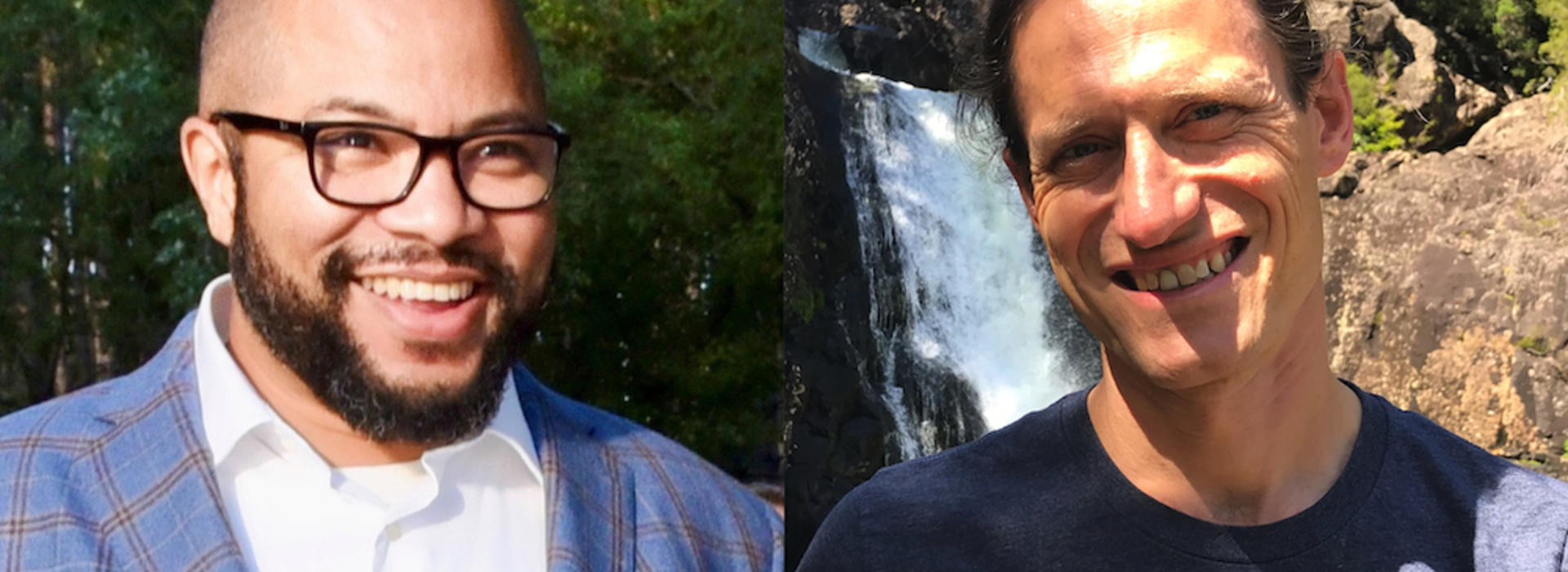
Two Assistant Professors Selected as Bush Fellows
Two University of Minnesota Medical School faculty members, Dziwe Ntaba, MD, assistant professor in the Department of Emergency Medicine, and Michael Westerhaus, MD, assistant professor in the Department of Medicine, have been selected as 2021 Bush Fellows.
The Bush Fellowship provides up to $100,000 over the course of one to two years for education and learning experiences that foster large-scale change at the local and regional level. Fellows have the flexibility to define what activities would help them become more effective and equitable leaders, including formal education, leadership training, networking or mentorship. Of the 538 applicants this year, 24 Bush Fellows were selected by a diverse group of community leaders and a committee of the program’s alumni.
Dr. Dziwe Ntaba
Dr. Ntaba, a Twin Cities native and emergency medicine physician with a global health background, has spent part of his career overseas helping open clinics in Burundi, East Africa. He co-founded Village Health Works, an organization that has grown that clinic into a 150-bed teaching hospital along with offering holistic programs in food security and education.
During the Ebola outbreak of 2014, he was deployed to Liberia for 13 months to help with the health system response, direct training programs and transition to post-outbreak system reactivation. His experience handling outbreaks led him to a consultancy with the World Health Organization supporting COVID-19 preparedness and response in the Kingdom of Tonga in early 2020.
“When I came back to Minnesota in March, I realized we were going to have a serious problem on our hands,” he said. “I started working with M Health Fairview Community Advancement doing outreach to the Cedar Riverside neighborhood supporting COVID-19 response needs.”
This included training property managers and environmental cleaning staff around biological safety and partnering with Dunwoody College to laser-cut face masks when they were in short supply.
“It became clear that the pandemic disproportionately affected certain populations, so I rededicated my interest into exploring health disparities, root causes and working to eliminate them,” he said.
This is when Dr. Ntaba turned to the Bush Fellowship to support his work.
“My goal is to explore new frameworks to better understand the psychosocial factors affecting health,” Dr. Ntaba said.
This might include how and why treatment with dignity and respect are such important influences in engagement with the health system and ways this might affect overall health outcomes. He also wants to better understand how this relates to underserved communities that experience general mistreatment and collective trauma as well as how best practices might be adapted in order to better serve affected populations.
“It’s a tremendous, once-in-a-lifetime opportunity,” Dr. Ntaba said. “I’m grateful to improve and enrich my own understanding of some of these issues that have interested me throughout my career and look for ways to act on those interests.”
Dr. Michael Westerhaus
Dr. Westerhaus practices at HealthPartners’ Center for International Health, a clinic focused on refugee and immigrant healthcare. Through the U of M School of Public Health, he trains future healthcare workers, including medical students, using a social medicine framework to both understand and respond to larger social forces that create health inequities, including racism, racial capitalism and settler colonialism. Dr. Westerhaus began learning about social medicine throughout his medical training and from colleagues in Uganda, where he spent time both in medical school and residency.
“I saw this as an opportunity to further deepen my leadership skills,” Dr. Westerhaus said. “All of us involved in health justice work have found that in order to bring about the systems of change we need, we have to broaden our audience in order to build collective power.”
Dr. Westerhaus hopes to explore three different buckets through self-guided study, the first being how storytelling, both oral and written, can humanize and connect people in the context of large-scale social forces. Another aspect of his training will include learning how to use performance to spark imaginative solutions to health inequities.
“The last bucket involves learning from leaders who teach that racialized trauma is lodged in all of our bodies, and that somatic and cultural practices are foundational, particularly for white-bodies like myself, in order to build and sustain multiracial coalitions that catalyze social change,” he said.
This self-guided study could include conversations with storytellers in the community to learn their craft, spending time with the zAmya Theatre Project to learn facilitation of theatre of the oppressed and coursework and mentoring related to somatic abolition. He eventually hopes to create a collective space where health workers can gather to learn these tools and then lead change in their own organizations and communities.
“I feel deeply grateful to receive this fellowship,” Dr. Westerhaus said. “I feel a degree of responsibility to stay committed, honest and uncomfortable in doing this work.”